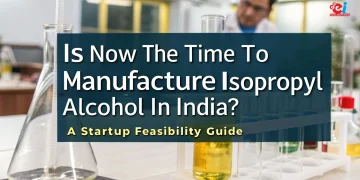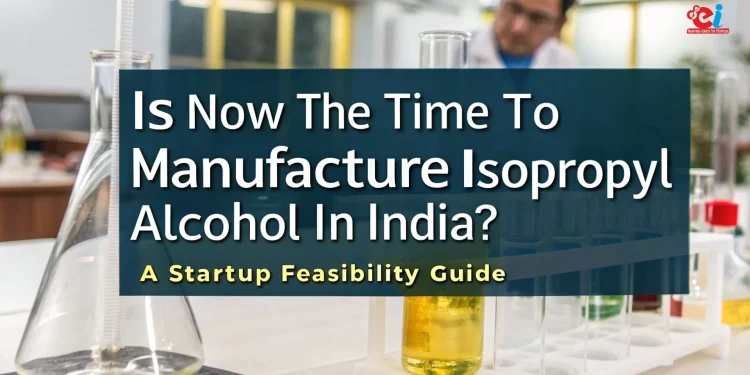Why Isopropyl Alcohol Deserves a Closer Look
The COVID-19 pandemic has made the world more cautious about healthcare and cleanliness. Isopropyl Alcohol manufacturing (IPA) became widely acclaimed as an industrial chemical during this period and has shown to be a disinfectant and cleaning agent. Furthermore, IPA is used in industries like pharmaceuticals, electronics, hygiene, and even automotive.
The pandemic showed a rise in the use of hand sanitizers which required IPA in bulk. This spike in demand estimated IPA’s post-pandemic demand to permanently stay higher than pre-pandemic demand. IPA has also found expanded uses in electronic manufacturing, diagnostics, and pharmaceuticals.
This scenario creates new prospects for Indian innovators. Despite India having access to necessary petrochemical feedstock, the country still depends on imports for IPA. Simultaneously, India is trying to cement its place in the global chemicals market. Thus, there is a demand for domestically produced Isopropyl Alcohol.
This guide will discuss the scope of setting up an IPA-manufacturing unit in India, examining the most relevant market trends and demand drivers along with the manufacturing process and strategic considerations for start-up.
Understanding IPA: The Science Behind the Clean Revolution
Isopropyl Alcohol, more commonly known as propan-2-ol, is a medical-grade disinfectant. It serves as a clear, ignitable liquid with a powerful alcoholic scent. IPA is soluble in water, ethanol, and nearly all organic solvents. Its two most common grades are:
- Pharmaceutical grade (USP/BP) – Used in hand hygiene and medicine.
- Industrial grade – Used in paint, coatings, electronics cleaning, and as a general purpose solvent.
IPA’s antibacterial and antiviral properties makes it ideal for use in hand sanitizers, surface disinfectant, and clinical blankets. In addition, IPA is used in electronics and optics due to its rapid evaporation rate and low toxicity for cleaning sensitive parts.
Related: How to start an Isopropyl Alcohol (IPA) Manufacturing Business
Market Demand and Growth Potential: A Steady Upward Growth Curve
Global Perspective
The global IPA market is expected to increase from 4.1 billion dollars in 2025 to approximately 5.6 billion by 2030, with a CAGR of 6.5%. The following factors drive demand:
- Increase in global awareness regarding hygiene.
- Growth in electronics, automotive, precision engineering industries.
- Expansion of the pharmaceutical and cosmetic industries.
India’s Demand Landscape
India’s growing demand for IPA stems from:
- Pharmaceuticals as a solvent or disinfectant.
- Electronics in cleaning PCBs and parts in semiconductors.
- Manufacturing of paints, inks, adhesives and personal care products.
India still relies on the United States, China, and South Korea for 30%-40% of its Isopropyl Alcohol (IPA) imports. Only a handful of large players in the petrochemical sector engage in local production. This supply gap is a promising opportunity for domestic producers, especially MSMEs and regional suppliers.
Startups looking to enter the IPA market are better positioned due to initiatives like “Make in India,” the Production-Linked Incentive (PLI) scheme, and the Movement Towards Self-Reliance in Active Pharmaceutical Ingredients (APIs) and solvents.
IPA Manufacturing Processes: How Isopropyl Alcohol Is Produced
There are two main industrial approaches to producing IPA:
1. Direct Hydration of Propylene
This approach remains the most applied and cost-effective in treating propylene, particularly when it comes from naphtha cracking units in petrochemical complexes.
Process Steps:
- Propylene gas is mixed with water vapor; this mixture is passed over a weakly acidic catalyst bed, mostly phosphoric acid supported on silica.
- Propylene gas is mixed with water vapor.
- The exothermic reaction forms IPA and water.
- IPA goes through a series of purification steps including distillation until high-purity IPA is obtained.
2. Indirect Hydration (Sulfuric Acid Route)
This approach uses concentrated sulfuric acid to react with propylene which forms mono and di isopropyl sulfate. Hydrolysis of these compounds with water yields IPA and sulfuric acid.
This approach is less favorable today due to being highly corrosive and harmful to the environment.
Related: Top 10 Chemicals to Manufacture in India for Maximum ROI
Raw Materials and Utilities
To establish an IPA manufacturing plant, the primary inputs are:
- Propylene – Obtained from local petrochemical refineries like IOCL, Reliance and BPCL.
- Water – needed for hydration and cooling.
- Catalysts – Phosphoric acid-based catalysts are used for direct hydration.
- Energy – Focused steam and electricity are needed for reaction control and distillation.
A steady supply of propylene feedstock is critical. Plants established near petrochemical centers like Dahej, Hazira, Panipat, or Jamnagar are advantageous to the supply of raw materials and the developed chemical industries.
India End-Use Industries Driving Demand
Several core and emerging sectors primarily drive India’s Isopropyl Alcohol (IPA) consumption.
Pharmaceuticals
IPA is used for the synthesis of active pharmaceutical ingredients (APIs) and for surface and instrument disinfection. India, as one of the world’s largest exporters of generics and APIs, has a strong embedded demand.
Personal Care and Hygiene
IPA is a critical component in the formulations of various products, including hand sanitizers, lotions, astringents and mouthwashes as the need for sanitization and hygiene continues to be prioritized among consumers.
Electronics and Semiconductor Manufacturing
IPA is extensively utilized in the cleaning of circuit boards, sensors, connectors, and other components. Following India’s announcement to create new electronics hubs under the PLI scheme for semiconductors, there is likely to be a growing need for high-purity IPA.
Automotive and Coatings
IPA serves as a degreasing solvent in paints, thinners, and inks. The IPA market is boosted by automotive manufacturing and infrastructure spending.
Laboratories and Industrial Cleaning
IPA is used in cleanrooms, labs, and manufacturing centers due to its fast evaporating and non-residual nature IPA ensures surfaces are clean and sanitized.
Startup Opportunities in IPA Production
Entrepreneurs looking to enter this market have many unique structural and strategic advantages:
- Import Substitution – Domestic production of IPA would eliminate imports enabling savings on foreign exchange while lowering supply risk.
- Proximity to Raw Materials – India has a well-developed infrastructure in petrochemicals making feedstock readily available.
- Multi-Sector Demand – Sectors such as pharmaceuticals, FMGC, and healthcare consume IPA and are less likely to be impacted by recessions.
- Scalability – Facilities can start small and expand as demand grows.
- Export Potential – Africa, the Middle East, and Southeast Asia have high demand for IPA with suitable purity standards.
Environmental and Safety Considerations
The Isopropyl Alcohol (IPA) industry is subject to strict environmental and workplace safety regulations due to them being volatile and flammable. IPA falls under these criteria, therefore:
- Emissions of VoC require recovery systems to capture vapors, minimizing environmental damage.
- Effluent Treatment is necessary to clean any discharged water used in the process.
- Facilities must incorporate explosion-proof instruments and strict handling protocols alongside vigorous fire-fighting systems to avoid explosions and fires.
Compliance with safety standards is simpler due to new automation processes.
The Role of NPCS in IPA Project Feasibility
For entrepreneurs looking to establish an IPA manufacturing factory, Niir Project Consultancy Services offers extensive technical assistance in evaluating the business potential.
NPCS creates custom Market Survey cum Detailed Techno-Economic Feasibility Reports for specific chemical projects such as Isopropyl Alcohol.
These reports include raw material and process manufacturing to plant layout and equipment selection highlighting compliance needs.
By leveraging decades of experience alongside detailed reports on new industrial ventures, NPCS guides entrepreneurs through evaluating risks and operational readiness.
Startups are enabled to approach financing institutions, technical partners, and regulatory bodies with more confidence after utilizing these comprehensive feasibility reports.
For more information, check our related videos on this article
Conclusion: A Timely and High-Potential Opportunity
The manufacturing of Isopropyl Alcohol in India is not just feasible—it’s a strategically sound move aligned with current market needs, government priorities, and global sourcing trends. With demand spread across high-growth industries and an existing supply gap waiting to be filled, startups can tap into a future-proof business model.
This is an ideal moment for entrepreneurs to make their mark in the industrial chemicals domain by starting small, building with compliance, and scaling with efficiency. With technical clarity from partners like NPCS and a clear understanding of market demand, startups can turn IPA production into a profitable, scalable, and socially relevant business.
Are you ready to explore IPA manufacturing as your next startup move? Start by securing a detailed feasibility report that gives you technical clarity, market insights, and a step-by-step roadmap. In chemical manufacturing, knowledge is your most powerful catalyst.


















